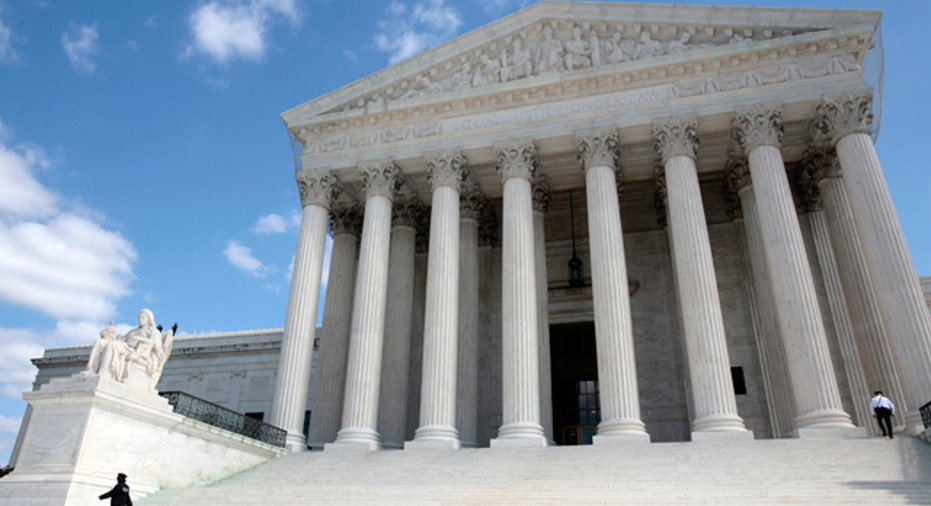Big Business vs. Customers: Supreme Court Weighs In

WASHINGTON – In a series of rulings this year, the U.S. Supreme Court has steered a consistent course against consumers or small businesses that want to bring class action lawsuits against corporate defendants.
Comcast Corp , Whirlpool Corp and Sears Holdings Corp's Sears Roebuck & Co are among the companies that have benefited from the court's rulings in recent months.
American Express Co was the latest to benefit in a ruling on Thursday that marked the last Supreme Court class action ruling before the court's nine-month term ends next week.
Out of a total of seven class action-related cases that the court took action on, only once did a defendant lose. Amgen Inc lost in a case that experts say was limited to certain lawsuits involving shareholder claims against companies.
Class action lawsuits usually are driven by specialist plaintiffs' lawyers, who file claims on behalf of groups of consumers over such issues as defective products and unfair business practices. In the Whirlpool and Sears cases, which are ongoing, the claims concern defective front-loading washing machines.
If successful, lawyers can make millions of dollars in legal fees. Individual plaintiffs generally recover much less, but supporters of the practice say it can be the only way consumers can pursue grievances against deep-pocketed companies.
The rulings over the current term often have shown the court to be divided along ideological lines and on occasion have prompted vociferous dissent from liberal members of the bench.
Justice Elena Kagan, one of the liberals, expressed her concerns about the trend on Thursday when the court ruled on a 5-3 vote in favor of American Express, saying that, in effect, the conservative majority doesn't ever see a class action case it likes.
"To a hammer, everything looks like a nail," she said.
Lawyers representing plaintiffs in class action cases thought Kagan hit the nail on the head.
"I could not have put it better myself," said Deepak Gupta, one of the lawyers representing the small businesses that lost in the American Express case. The court ruled against merchants that challenged the legality of an arbitration clause in a contract with American Express that prevented them from coming together to pursue disputes against the credit card company.
The case rested in large part on to what extent class actions are affected by arbitration agreements that consumers or small businesses sign with a larger corporation. Those agreements can include language preventing claims from being litigated as a class.
In the majority opinion, Justice Antonin Scalia, one of the conservative members of the bench, wrote the court's ruling was in line with a 2011 ruling in a case called AT&T Mobility v. Concepcion, in which the court said an arbitration agreement prevented consumers from pursuing a class action under state law.
PRO-BUSINESS COURT?
The class action-related rulings are among those that have prompted liberal-leaning groups, including the Alliance for Justice, to claim the court is pro-business.
Speaking to reporters on Thursday after the American Express ruling, Michelle Schwartz, the group's director of justice programs, said the court was "brick-by-brick, building a wall of protection around big corporations."
Kate Comerford Todd, a lawyer with the U.S. Chamber of Commerce's litigation arm, contested that view, saying the plaintiffs' lawyers' lobby was merely "trying to protect its lifeblood, which is the class action lawsuit."
Todd and others with ties to corporate defendants said the court's recent decisions had not led to any major shifts in the law.
Andrew Pincus, an attorney at the Mayer Brown law firm in Washington, said that both the American Express case and March's ruling in favor of Comcast, probably the two most high-profile on the list, were "foreshadowed by prior decisions."
In the American Express case, it was the AT&T ruling, and in the Comcast case, it was another 2011 ruling, concerning class action claims against Wal-Mart Stores Inc .
"I have a hard time seeing this term as cataclysmic for real people," he added.
LEGACY OF WAL-MART
The court's class action decisions this year indicate that a majority of the justices are keen to force home the message sent out by the 2011 Wal-Mart v. Dukes case. The ruling was unanimous, although the justices were split 5-4 on some issues.
The court said then that judges must make sure that claims are sufficiently similar before they are certified as class actions.
In that case the court decertified a class action of as many as 1.5 million Wal-Mart female workers who accused the world's largest retailer of bias in pay and promotions.
The ruling put the focus on Rule 23 of the Federal Rules of Civil Procedure, which dictates how mass claims can be certified, meaning the cases can go ahead.
The Comcast decision, on a 5-4 vote in which Scalia wrote the majority opinion, saw the court reaffirm its finding in the Wal-Mart case.
The court repeated a "simple clear message" that the rule for certifying class actions "means what it says," the U.S. Chamber's Todd said.
As in the Comcast case, the liberal justices objected. There was another withering dissenting opinion, authored jointly by Justices Ruth Bader Ginsburg and Stephen Breyer, in which they wrote the court should never have taken up the issue.
"Today the court reaches out to decide a case hardly fit for our consideration," they wrote.
(Reporting by Lawrence Hurley; Editing by Howard Goller and Lisa Shumaker)



















